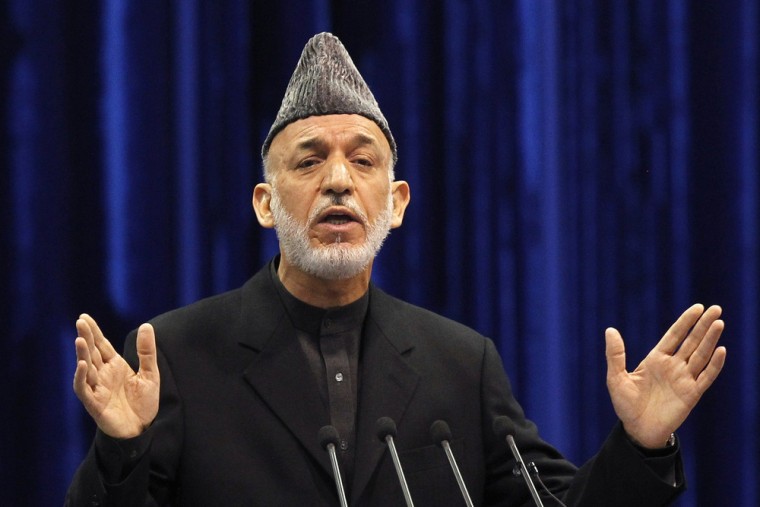
KABUL - Afghan President Hamid Karzai told tribal leaders Thursday that he did not trust the United States, hours after Secretary of State John Kerry said a final draft deal on troop levels had been reached.
"My trust with America is not good," Karzai said at a meeting of tribal elders and political leaders in Kabul. "I don't trust them and they don't trust me. During the past 10 years I have fought with them and they have made propaganda against me."
His remarks were made at the Loya Jirga - a grand council of tribal elders and political leaders – to support the new security deal governing relations between the U.S. military and the Afghan government for years to come.
Karzai faces a challenge in persuading the Loya Jirga to accept the pact, which allows for between 10,000 and 15,000 international troops - mostly U.S. - to remain in Afghanistan another decade or more.
The new proposal, still to be approved by both the U.S. and Afghan administrations, calls for a sweeping, long-term relationship with the United States, committing Washington to paying to train and equip Afghan security forces, and establishes the groundwork keeping armed American outposts in Afghanistan.
Although it allows for troop presence until 2024, the draft document says, “unless otherwise mutually agreed, United States forces shall not conduct combat operations in Afghanistan.”
In a speech, Karzai assured his audience that the new deal would mean U.S. forces will no longer be allowed to enter the homes of Afghans, except for some exceptional cases.
“In the past 12 years we have had both good and bad times with the U.S.,” he said. “Sometimes our relations are good and sometimes the relations are terrible. At some points, I thought about telling the U.S. to just leave Afghanistan and we will deal with our own situation. But I was always very patient and thinking about our country. We should be careful not to take a wrong step forward.”
He also stressed the importance of strategic ties with Washington: “We need a good friend in the U.S. You cannot live in this global village without a friend - but you need to have a strong, faithful friend.”
Karzai’s office also released a copy of a letter from President Barack Obama promising that “America's role in Afghanistan will be one of a supporting partner.”
The letter to Karzai said: “We will be cooperating in training, advising, and assisting your forces and in a targeted, smaller counter terrorism mission as we continue to help strengthen Afghanistan's own growing counter terrorism capabilities.”
Kerry later told Andrea Mitchell that the U.S. had no plans for American troops to be in Afghanistan in the longer term.
“We are not targeting year and years, that is not what is contemplated,” he said.
The five-day meeting will now debate the draft and decide whether U.S. troops will stay or leave Afghan forces to fight the Taliban insurgency alone.
The agreement is highly significant because it outlines a broad, long term relationship with Afghanistan that commits the United States to sustaining the Afghan security forces for years to come, and likely deploying thousands of American troops in the country to carry out that training and the limited counter-terrorism role.
Every country where the United States maintains troops has a status of forces agreement. Afghanistan, however, appears to be a case apart. Afghanistan would be financially, and perhaps physically, dependent on its relationship the U.S. forces, which is not the case for Italy, Germany, Japan or other nations where the U.S. has a military presence.
NBC News’ Andrea Mitchell, Richard Engel, Aarne Heikkila and Catherine Chomiak contributed to this report.
Related: